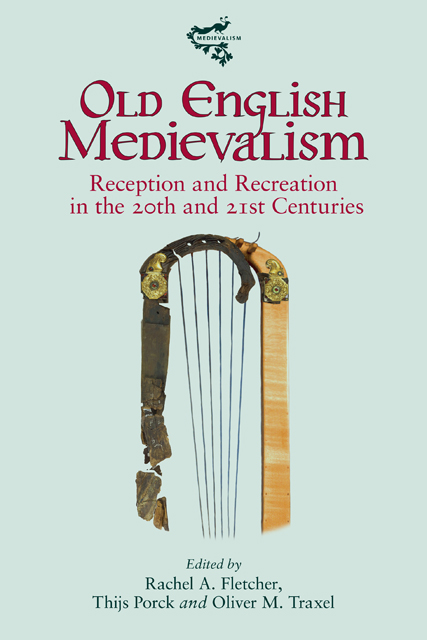Book contents
- Frontmatter
- Contents
- List of Illustrations
- List of Contributors
- Acknowledgements
- List of Abbreviations
- Early Medieval English in the Modern Age: An Introduction to Old English Medievalism
- I Reinventing, Reimagining and Recontextualizing Old English Poetry
- II Invoking Early Medieval England and Its Language in Historical Fiction
- III Translating and Composing in Neo-Old English
- IV Approaching Old English and Neo-Old English in the Classroom
- Bibliography
- Index
- Medievalism
6 - At the Threshold of the Inarticulate: The Reception of ‘Made-up’ English in Paul Kingsnorth’s The Wake (2014)
Published online by Cambridge University Press: 17 December 2022
- Frontmatter
- Contents
- List of Illustrations
- List of Contributors
- Acknowledgements
- List of Abbreviations
- Early Medieval English in the Modern Age: An Introduction to Old English Medievalism
- I Reinventing, Reimagining and Recontextualizing Old English Poetry
- II Invoking Early Medieval England and Its Language in Historical Fiction
- III Translating and Composing in Neo-Old English
- IV Approaching Old English and Neo-Old English in the Classroom
- Bibliography
- Index
- Medievalism
Summary
This chapter continues the interrogation of Paul Kingsnorth’s The Wake (2014). It considers the impetus behind The Wake’s use of a ‘made-up’ English that has close links with the language of early medieval England. Responses to Kingsnorth’s made-up English are remarkably varied, as becomes evident when comparing the reactions of linguistic and literary scholars and readers. However, there has been little if any investigation into the reasons for such variation. By positioning reactions to made-up Englishes in relation to studies of reading strategies and eye-tracking research, this chapter contributes to this little-researched area. Forming an initial enquiry into this subject, it makes use of evidence from other disciplines both within and outside of early medieval studies. Such interdisciplinarity is particularly fitting in an examination and comparison of responses from readers of different disciplines and backgrounds, and it is to be hoped that this initial enquiry will both inform and in turn be further informed by scholars with more nuanced appreciation of the individual academic frameworks involved.
Made-up English in The Wake and Elsewhere
This chapter’s employment of the term ‘made-up English’ is deliberate. It refers to Englishes that have been altered (or made up), often individually tailored for a particular literary text. The use of ‘made-up’ foregrounds the importance of creativity both in the making and in the application of such Englishes, as well as pointing to their individually specific natures. The quality of made-upness includes permission for such Englishes to depart significantly from known frameworks and agreed conventions. Made-up Englishes are highly valuable for creative writers in that they directly affect and enrich a text’s production of meanings. Such changes can occur through shifts in context, manipulation of words and syntax, or unusual collaged juxtapositions in these different Englishes. The texts written in such Englishes might also include unconventional shifts in form and layout. In each case, these changes contribute significantly to the production of the text’s meanings, both by departure from and relation to the specific English that a reader knows well. Readers of made-up Englishes can have very different reactions. On a superficial level, these different reactions are seen to stem from whether the reader is approaching the text for literary, linguistic or other purposes.
- Type
- Chapter
- Information
- Old English MedievalismReception and Recreation in the 20th and 21st Centuries, pp. 115 - 134Publisher: Boydell & BrewerPrint publication year: 2022
- 1
- Cited by



